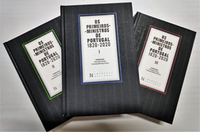Publication of the book ‘The Prime Ministers of Portugal (1820-2020)’
Coordinated by Fernando de Sousa and Conceição Meireles Pereira and with the participation of dozens of renowned researchers, this three-volume work, published by Imprensa-Nacional Casa da Moeda, reveals the biographies of the 81 individuals who have held the office of Prime Minister from the definitive triumph of Liberalism to the present day.
The first volume includes an introductory study, made up of three chapters, the first of which is dedicated to the slow affirmation of the position of Prime Minister in Portugal, from the Liberal Revolution of 1820, in which the prominence of certain ministers over other members of the government is detected, to the de facto establishment of the Head of Government in 1834, the President of the Council of Ministers, not yet legally and formally enshrined, which will occur in 1855. The second chapter analyses the constitutional experiences in Portugal, identifying the organs and functions of state, and then looking at the evolution of the Prime Minister as a constitutional body . The third chapter takes a sociological approach to the Prime Ministers in Portugal over the same period of time, summarising the fundamental aspects that have to do with their identity and civic and political functions, in order to outline their general profile and present an overview of the personalities who have held this office.
This is followed by the centrepiece of this book, the biographies of Portugal's Prime Ministers, chronologically ordered by the different historical and political periods of contemporary Portugal. Thus, the first volume, in the form of biographical notes, covers the time between the Liberal Revolution and the definitive establishment of Liberalism (1820-1834) and, already in a developed format, the Constitutional Monarchy (1834-1910); the second volume deals with the First Republic (1910-1926); and the third volume covers the periods of the Military Dictatorship and Estado Novo (1926-1974) and Democracy (1974-2020), bringing to a close the two centuries covered by this comprehensive and, we believe, fundamental work for understanding the role played by these personalities in the political management of contemporary Portugal.

